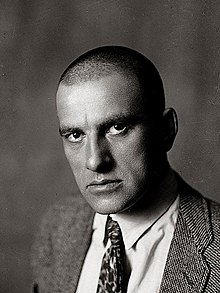
Back Wladimir Majakofski Afrikaans فلاديمير ماياكوفسكي Arabic فلاديمير ماياكوفسكى ARZ Vladímir Mayakovski AST Vladimir Mayakovski Azerbaijani ولادیمیر مایاکوفسکی AZB Маяковский Владимир Владимирович Bashkir Уладзімір Уладзіміравіч Маякоўскі Byelorussian Уладзімер Маякоўскі BE-X-OLD Владимир Маяковски Bulgarian
Vladimir Mayakovsky | |
|---|---|
 Mayakovsky in 1920 | |
| Born | Vladimir Vladimirovich Mayakovsky 19 July [O.S. 7 July] 1893 Baghdati, Kutais Governorate, Russian Empire |
| Died | 14 April 1930 (aged 36) Moscow, Russian SFSR, Soviet Union |
| Alma mater | Stroganov Moscow State University of Arts and Industry, Moscow School of Painting, Sculpture and Architecture |
| Period | 1912–1930 |
| Literary movement | Russian Futurism |
| Signature | |
 | |
Vladimir Vladimirovich Mayakovsky (UK: /ˌmaɪəˈkɒfski/,[1] US: /ˌmɑːjəˈkɔːfski/;[2] Russian: Влади́мир Влади́мирович Маяко́вский, IPA: [vlɐˈdʲimʲɪr vlɐˈdʲimʲɪrəvʲɪtɕ məjɪˈkofskʲɪj] ; 19 July [O.S. 7 July] 1893 – 14 April 1930) was a Russian and Soviet poet, playwright, artist, and actor.
During his early, pre-Revolution period leading into 1917, Mayakovsky became renowned as a prominent figure of the Russian Futurist movement. He co-signed the Futurist manifesto, A Slap in the Face of Public Taste (1913), and wrote such poems as "A Cloud in Trousers" (1915) and "Backbone Flute" (1916). Mayakovsky produced a large and diverse body of work during the course of his career: he wrote poems, wrote and directed plays, appeared in films, edited the art journal LEF, and produced agitprop posters in support of the Communist Party during the Russian Civil War of 1917–1922. Though Mayakovsky's work regularly demonstrated ideological and patriotic support for the ideology of the Bolsheviks and a strong admiration of Vladimir Lenin,[3][4] his relationship with the Soviet state was always complex and often tumultuous. Mayakovsky often found himself engaged in confrontation with the increasing involvement of the Soviet state in cultural censorship and the development of the State doctrine of Socialist realism. Works that criticized or satirized aspects of the Soviet system, such as the poem "Talking With the Taxman About Poetry" (1926), and the plays The Bedbug (1929) and The Bathhouse (1929), met with scorn from the Soviet state and literary establishment.
In 1930, Mayakovsky killed himself. Even after death, his relationship with the Soviet state remained unsteady. Though Mayakovsky had previously been harshly criticized by Soviet governmental bodies such as the Russian Association of Proletarian Writers (RAPP), Premier Joseph Stalin described Mayakovsky after his death as "the best and the most talented poet of our Soviet epoch".[5]
- ^ "Mayakovsky, Vladimir". Lexico UK English Dictionary. Oxford University Press. Archived from the original on 18 April 2021.
- ^ "Mayakovsky". Random House Webster's Unabridged Dictionary.
- ^ Mayakovsky, Vladimir (1985). "Conversation with Comrade Lenin". Selected Works in Three Volumes. Vol. 1 (Selected Verse). English poem trans. Irina Zheleznova. USSR: Raduga Publishers. pp. 238. ISBN 5-05-00001 7-3.
On snow-covered lands / and stubbly fields, / in smoky plants / and on factory sites, / with you in our hearts, / Comrade Lenin, / we think, / we breathe, / we live, / we build, / and we fight!
- ^ Mayakovsky, Vladimir (1960). "At the Top of My Voice". The Bedbug and Selected Poetry. trans. Max Hayward and George Reavey. New York: Meridian Books. pp. 231–235. ISBN 978-0253201898.
When I appear / before the CCC / of the coming / bright years, / by way of my Bolshevik party card, / I'll raise / above the heads / of a gang of self-seeking / poets and rogues, / all the hundred volumes / of my / communist-committed books.
- ^ Sundaram, Chantal (2000). Manufacturing Culture: The Soviet State and the Mayakovsky Legend 1930–1993. Ottawa, Canada: National Library of Canada: Acquisitions and Bibliographical Services. pp. 71, 85. ISBN 0-612-50061-6.
© MMXXIII Rich X Search. We shall prevail. All rights reserved. Rich X Search